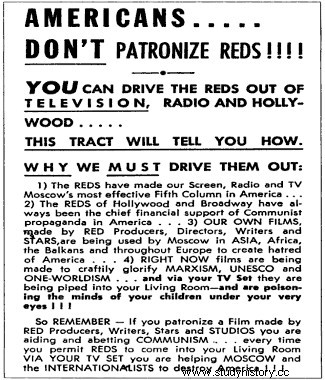(FGV-SP) We can define McCarthyism as:
a) A harsh investigation campaign directed by US parliamentarians, aimed at anyone suspected of subversion or collaboration with communist countries.
b) An anti-Semitic campaign that was established in the United States after the Second World War and that investigated the links between Jews and Soviet leaders.
c) A campaign of investigations that targeted trade unionists, intellectuals and scientists and spared Hollywood artists, film directors and American writers.
d) An advertising campaign that sought to praise Senator Joseph McCarthy, Republican candidate for the Presidency of the United States of America and who was deeply anti-communist.
e) A policy of approximation between the USA and the Soviet Union led, in the 1940s, by the socialist Joseph McCarthy, due to the need to defeat Nazi-fascism.
question 2(Fatec) McCarthyism in the 1950s in the United States was a movement that aimed to:
a) give equal opportunities to black American minorities.
b) remove from public office and important positions in the economy and society elements that could have sympathies for the Soviet regime.
c) bring to the presidency Senator Douglas McArthur, the commander-in-chief of the allied forces in the Pacific during World War II.
d) prevent racial integration in the Southern States of the United States during the presidency of General Eisenhower.
e) contain Soviet expansionism through a clear delimitation of US zones of influence.
question 3Read the excerpt below:
“[...] a federal police commissioner called me; according to the order he had received, he advised me that I should await summons to appear, in Washington, before the Commission on Un-American Activities. We were nineteen notified. […] I sent a telegram to the conveners, emphasizing that I had a vast company on hold, with significant losses […]. However – I concluded –, as a preliminary statement, I can immediately say that I am not a communist, nor have I ever joined any political party or organization, being just what is called 'a pacifist'. I hope this will not shock (sic) the Commission.
Sincerely, Charlie Chaplin.”
CHAPLIN, Charles. My life. Rio de Janeiro:José Olympio, 1989.
The investigation of people involved in “un-American activities” reached several sectors of American society during the 1950s, including the artistic groups in Hollywood. In the context of the Cold War, these investigations and persecutions triggered by McCarthyism associated anti-Americanism with:
a) fascism.
b) Nazism.
c) nationalism.
d) communism.
e) liberalism
question 4The McCarthyist pamphlet reproduced below is an example of a campaign against what was supposed to be the influence of the Reds (reds, communists) in the entertainment production of the American cultural industry.

According to the perspectives divulged by the McCarthyists, the influence of the Reds, mainly in Hollywood, intended, among other objectives:
a) use Hollywood and Broadway productions for communist propaganda.
b) disseminate the need to form a Communist Party of the USA.
c) carry out propaganda against Nazism.
d) influence children against liberalism.
e) spread anti-communist positions around the world.
answers Question 1Letter A. In the context of the Cold War, McCarthyism represented a true “witch hunt” in the USA, seeking to investigate the political actions of thousands of citizens of the country allegedly linked to communism. One of Senator Joseph McCarthy's goals was to criminalize communism and its adherents by curtailing political liberties.
question 2Letter B. Civil servants and a number of people in American society were investigated or lost their jobs during McCarthyism. Even film and science celebrities were persecuted during this period of political paranoia.
question 3Letter D. Anti-American activities was the name given to the political practice of adherents of communism or even people who would only be suspicious to the US authorities, even if there was no evidence against them.
question 4Letter A. One of the main concerns of McCarthyists was that film, theatrical and television productions would be used for communist propaganda in the US, especially within American homes.
